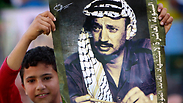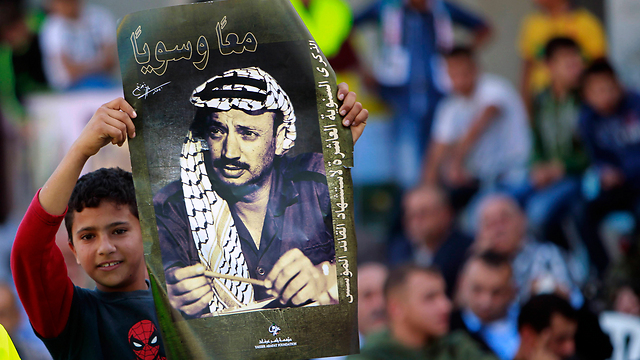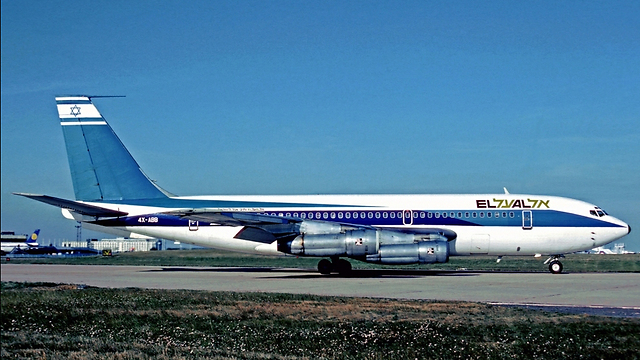
On February 18, 1969, four Palestinian terrorists armed with hand grenades and AK-47 rifles assaulted an El Al plane in Zurich. The terrorists opened fire at the aircraft as it prepared to take off for Israel, seriously wounding pilot Yoram Peres, who died of his injuries about a week later.
One thing the terrorists of the Popular Front for the Liberation of Palestine (PFLP) did not take into account was security on El Al flights. The flight's security officer, Mordechai Rahamim, sprinted to the cockpit, from where he engaged in a firefight with the attackers. Rahamim killed one of the terrorists. Swiss police arrested the other three. It was the first case of Palestinian terrorism on Swiss soil, and it paved the way for further attacks over the next two years.
In February, 1970, the PFLP destroyed a Swissair plane by detonating an explosive device that had been smuggled on board. The 47 passengers, including 15 Israelis, died. On September 6 of that same year, Palestinian terrorists hijacked a Swissair flight en route to the United States and landed it in Jordan alongside three other international airlines' crafts – from the US, the UK, and Germany – that had also been hijacked, with hundreds of passengers.
It was then that Swiss government officials decided to take action and began top-secret negotiations with the Palestinian Liberation Organization (PLO), which was then still considered an international terrorist group. The Swiss goal was to reach an understanding with the terrorists in order to prevent further attacks on Swiss soil and against Swiss targets.
A new Swiss book by journalist Marcel Gyr of Neue Zürcher Zeitung examines this part of Switzerland's history.
Since the book's publication last Sunday and accompanying publicity, a public controversy has erupted in the country, which is famous for its strict neutrality in international politics.
According to the book, a small high-ranking Swiss delegation led by then-foreign minister Pierre Graber secretly met with senior PLO officials at a Geneva hotel. Among these PLO officials was Farouk Kaddoumi, then Yasser Arafat's right-hand man and secretary-general of Fatah's central committee. The Swiss allegedly suggested a proposal to the Palestinians in the meeting: Stop committing terrorism in our country, and we will support you in political and diplomatic matters.
Contact was made between the two sides with the help of Jean Ziegler, a left-wing Swiss politician who is still a member of the Advisory Committee of the UN Human Rights Council. Ziegler was married to an Egyptian and was closely connected to Arab diplomatic circles in Switzerland, including Palestinians. Graber and Ziegler thus effectively violated a clear Swiss commitment to the US, UK, Germany and Israel to avoid dealing with the airplane crisis on its own. These countries had agreed to only handle the issue with complete coordination between all of them.
It now seems clear that the Swiss acted on their own initiative with the goal of ending Palestinian terrorism targeting Swiss interests. The details of the "surrender to terrorism agreement," as Swiss media outlets have dubbed the revelations, are still mostly classified. What is clear is that the Swiss agreed to Palestinian demands and vowed to free Palestinian terrorists who had only been arrested a year earlier after the El Al attempted hijacking.
They also vowed to support the PLO in diplomatic circles, and promised to grant it observer status in UN institutions in Geneva. Most important of all, say Swiss commentators, is that their country became hostage to Arafat and his terror group. The Palestinians, according to the book, exploited this agreement over a number of years, threatening the Swiss that if they didn't accede to their political demands, they would go public with the sides' secret agreement. Moreover, they warned the Swiss that they "could not guarantee against the return of terror activity against Swiss targets."
With the full scope and depth of the "surrender" agreement yet to be discovered, its ramifications over the years also remain unclear. An interesting side-note that did emerge is that Sufian Kaddoumi, a relative of Farouk Kaddoumi, was charged with planning and carrying out the blowing up of a Swiss plane in February 1970. Farouk Kaddoumi today lives in Tunisia. He confirmed the details of the agreement to the Swiss journalists who uncovered the story, as did Zilger, the Swiss politician.
The 1970s and '80s were characterized by the wave of Palestinian terror that swept across the globe in an attempt to bring the "Palestinian problem" to the world's attention. The period was marked by murders, aircraft-hijackings and the massacre of Israeli athletes at the Olympic Games in Munich.
The PLO's primary demands were the release of Palestinian terrorists held in Israeli jails and international recognition of their struggle. Menachem Gantz, Ynet's Rome correspondent, revealed a few years ago that Italy had also reached a similar surrender agreement with the Palestinians. In an interview with the paper in 2008, former Italian President Francesco Cossiga acknowledged that his country "allowed Palestinian terrorists to carry out terror attacks against Jews and Israelis in its territory, in return for refraining from attacking Italian targets."
"In return for a free hand in Italy," Cossiga revealed, "the Palestinians promised that Italy and Italian targets outside the country's borders would be safe from terror attacks – as long as those targets didn't cooperate with Zionists and the State of Israel."


















